Film & Video
Film & Video
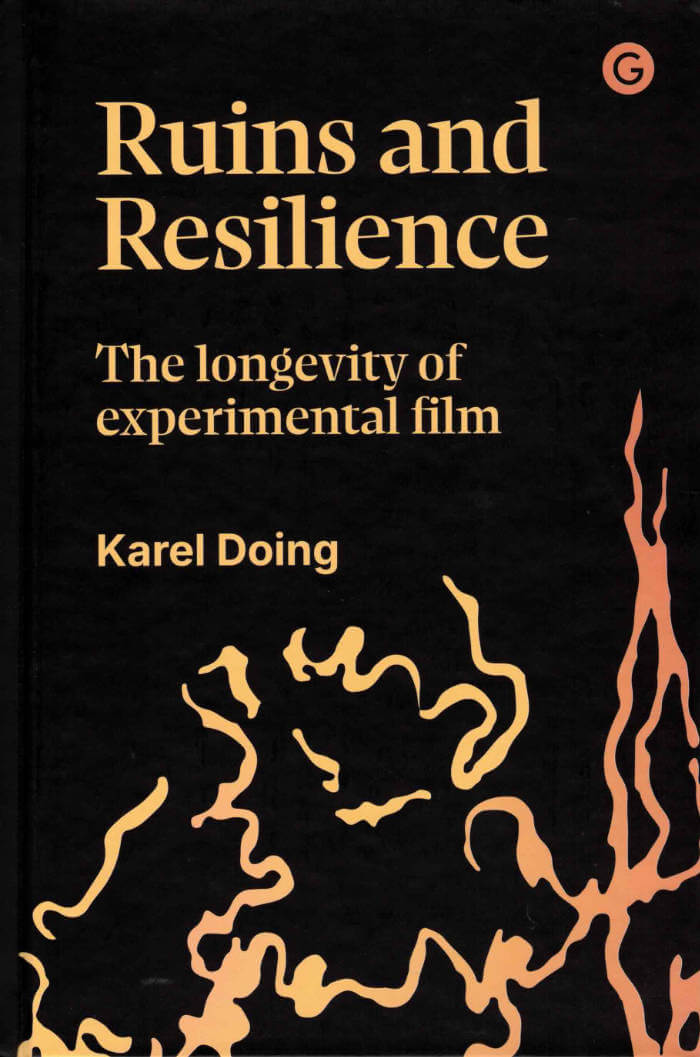
Ruins and Resilience: The Longevity of Experimental Film
Experimental film practice from an international and transdisciplinary perspective.
Karel Doing is an experimental filmmaker and researcher who has worked across the globe with fellow artists and filmmakers, creating a body of work that is difficult to pinpoint with a simple catchphrase. In Ruins and Resilience he weaves autobiographical elements and critical reviews together with his wide ranging interdisciplinary approach, reflecting on his own practice by positioning key works within the context of a vibrant experimental film scene in Europe, North and South America, and Asia. Doing demonstrates how experimental filmmakers have continued to renew their practice despite the almost total demise of analog motion picture film and the constant neglect of this art form by institutions and critics. Written in a fluent and accessible style, the book looks into the connections between the work of groundbreaking artists within the field and subjects such as transgression, improvisation, collectivity, materiality, phenomenology, and perception. Specifically, intersections with music and sound are investigated, appealing to the idea of the cross-modal brain, the ability to perceive sounds and images in an integrated way. Instead of looking again at the "golden era" of experimental film, the book starts in the 1980s, showing how this art form has never ceased to surprise and inspire. The author's hands-on engagement with the medium is formational for his more theoretical approach and writing, making the book a highly original contribution in the field that is informative and inspiring for academic and practitioners alike.
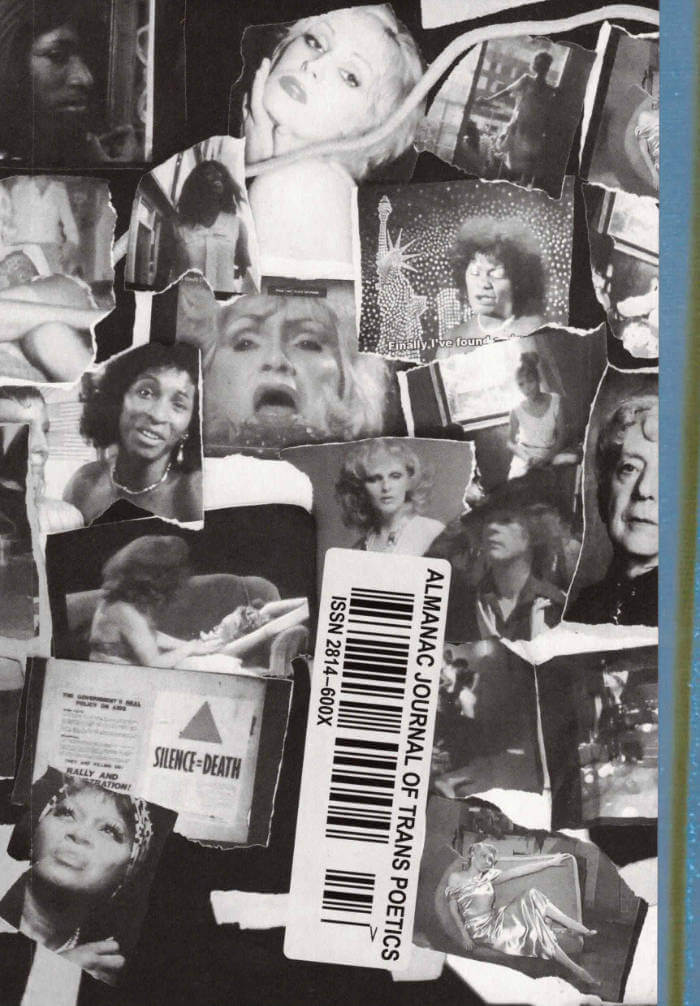
Almanac Journal of Trans Poetics: ISSUE #3 Cinema
In this issue, you’ll find different angles and takes on trans cinema. Featuring 22 contributors — the issue got pieces on gothic cinema, growing up as a TV kid in the 90s, trans femme film favs, cripness in Cronenberg’s work, love letters to the intimacy of the cinema hall and much more!
Sit back and get comfortable and let this third release take you on a journey through interviews, essays, comics, YouTube playlists, top favourite movie lists and beautiful, powerful film stills. This one is not to be missed!
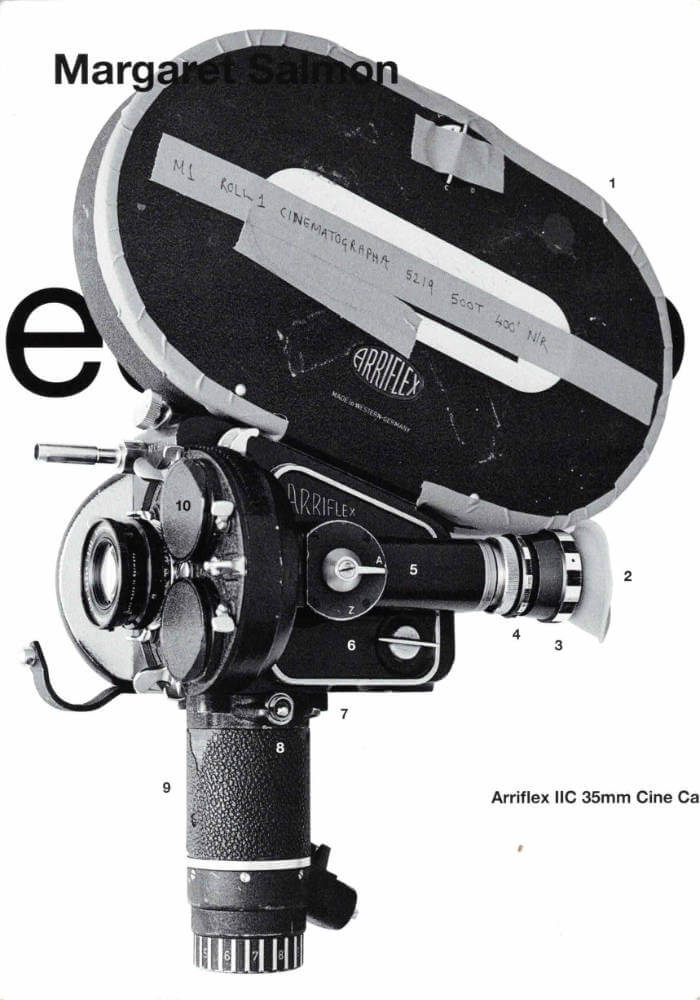
Cinematographa
Conceived by artist and filmmaker Margaret Salmon, this publication is a tribute to a group of innovative sister cinematographas and to the analogue motion picture camera. The book pairs an enquiry into women’s filmmaking practice with a comprehensive survey of experimental analogue technique across generations.
Nine filmmakers – Peggy Ahwesh, Betzy Bromberg, Rose Lowder, Babette Mangolte, Rhea Storr, Deborah Stratman, Alia Syed, Malena Szlam and Salmon herself, speak about the ways they use and think about their cameras, sharing technical knowledge and reflections on camera work to reveal their creative philosophies and intentions.
Included with the book is a separate manual: “An Artists' Guide to Analogue Cinematography”. This learning pamphlet was written and photographed by Salmon, and includes step by step instructions to the loading and basic use of three cine cameras.
Texts: Peggy Ahwesh, Betzy Bromberg, Rose Lowder, Babette Mangolte, Margaret Salmon, Rhea Storr, Deborah Stratman, Alia Syed, Malena Szlam

desespiegles
This publication is presented as an object-book-manifesto of a ‘desespiegles’ way of thinking. It “translates” the trains of thought that architect-artists Anne Philippe and Jolien Naeyaert exchanged via videoletters. The videoletters mainly occurred during the covid period. Questioning the scope of the addressed images, these exchanges revealed a play of symmetries. It shows a series of interrogations, linking the intimate with the collective. The move towards a publication was obvious after conversations with Loes, Phyllis, An and Teresa of nadine. The desire to activate reading in a performative way, mirrors the exchange of videoletters. It continues the process-based methodology that inventively gave birth to a publication through the physical manipulation of the work. The riso-technique proved particularly suitable for this project, as the hands, the gaze and the exchange all played a role during the object-making process.
Dannie.n is an art-zine, published by nadine, about the artistic research, themes, and topics of discussion of the artists involved in nadine. nadine invites an artist or collective to create each new edition.
Dannie.p is a limited-edition artist's book by desespiegles (57 copies). nadine is supported by Vlaamse Gemeenschap, VGC, Brussels Hoofdstedelijk Gewest.

Secession / Charlie Prodger
Charlie Prodger works across moving image, writing, sculpture, drawing and printmaking. Through the prism of queer subjectivity, her work explores intertwined relations between the body, landscape, language, technology and time. To accompany her exhibition and the presentation of the complete film trilogy—Stoneymollan Trail, BRIDGIT, and SaF05—a book with a substantial essay by Sarah Hayden is released in Secession’s publication series.
The London-based author and associate professor of literature and visual culture analyzes the significance of voice and voiceover in Prodger’s video works. For the book, the artist has created a series of image pairings of production photos and video stills from the final part of the trilogy, SaF05.

KAMERA CAHIER N° 8
A special edition issue curated, designed and published by AVARIE, Paris and Labor Neunzehn, Berlin. It accompanies KAMERA SERIES, while it is an independent and valuable object to collect.
The central idea that informs and directs the booklets’ montage is the interplay between the concepts of addition and subtraction. This is achieved by unveiling a missing image in the screening or an unreleased second from an artist's film, expanded to 24 pages. Additionally, each booklet contains a piece directly removed from the show.
The editing establishes a dialogue between film frames and performed writings derived from texts, scripts, storyboards, and notes. The KAMERA exhibition is consequently extended into a physical space—the book—allowing for its widespread dissemination, complementing and contrasting with its potential online occurrence.
KAMERA SERIES is a screening program of experimental films, video art works and printed matter taking place in a former GDR building in Berlin.

KAMERA CAHIER N° 5
Louise Crawford, Stéphan Guéneau
A special edition issue curated, designed and published by AVARIE, Paris and Labor Neunzehn, Berlin. It accompanies KAMERA SERIES, while it is an independent and valuable object to collect.
The central idea that informs and directs the booklets’ montage is the interplay between the concepts of addition and subtraction. This is achieved by unveiling a missing image in the screening or an unreleased second from an artist's film, expanded to 24 pages. Additionally, each booklet contains a piece directly removed from the show.
The editing establishes a dialogue between film frames and performed writings derived from texts, scripts, storyboards, and notes. The KAMERA exhibition is consequently extended into a physical space—the book—allowing for its widespread dissemination, complementing and contrasting with its potential online occurrence.
KAMERA SERIES is a screening program of experimental films, video art works and printed matter taking place in a former GDR building in Berlin.
75 numbered copies +
screenprinted newsprints’ fragment
24 pages / color plates
book size 21 x 14,5 cm
papers fedrigoni sirio rough pearl 210 and arena white rough 120

KAMERA CAHIER N° 2
A special edition issue curated, designed and published by AVARIE, Paris and Labor Neunzehn, Berlin. It accompanies KAMERA SERIES, while it is an independent and valuable object to collect.
The central idea that informs and directs the booklets’ montage is the interplay between the concepts of addition and subtraction. This is achieved by unveiling a missing image in the screening or an unreleased second from an artist's film, expanded to 24 pages. Additionally, each booklet contains a piece directly removed from the show.
The editing establishes a dialogue between film frames and performed writings derived from texts, scripts, storyboards, and notes. The KAMERA exhibition is consequently extended into a physical space—the book—allowing for its widespread dissemination, complementing and contrasting with its potential online occurrence.
KAMERA SERIES is a screening program of experimental films, video art works and printed matter taking place in a former GDR building in Berlin.
75 numbered copies + 16 mm film print
24 pages / color plates
book size 21 x 14,5 cm
papers fedrigoni sirio rough pearl 210 and arena white rough 120
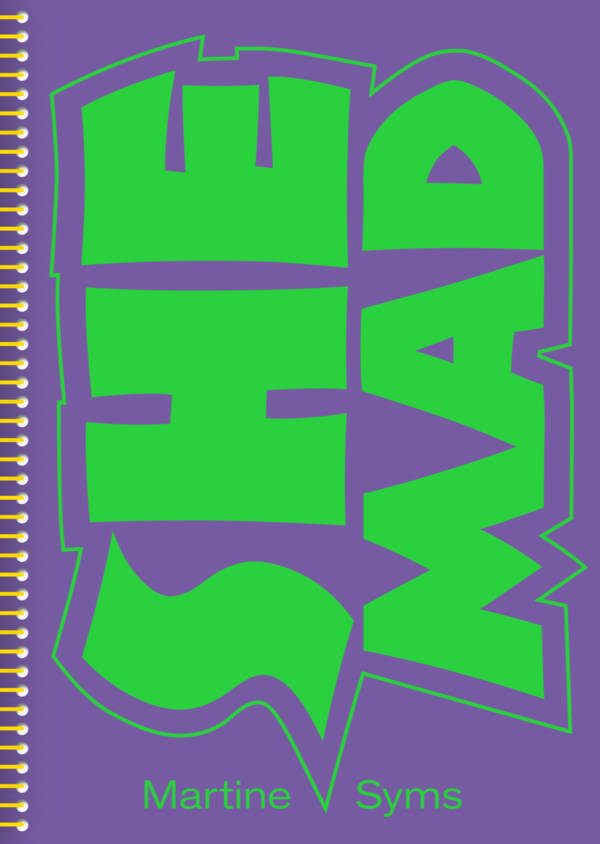
She Mad
She Mad gathers materials and documentation on Martine Syms' seminal episodic project of the same name. Each episode of this series takes a different format, using various narrative formats, from sitcoms to TikTok videos, and includes filmed footage as well as research materials. Each episode revolves around a protagonist, also named Martine—an overachieving, stoner graphic designer who lives in Hollywood and wishes she were an important artist.
The first episode Pilot for a Show about Nowhere (2015) merges a semi-autobiographical account of Syms' own life as a young black woman with a video essay-like narrative on the history of commercial television and its assumed target audiences. The episode Laughing Gas (2016) draws on early cinema, specifically the 1907 silent film of the same name by Edwin Porter, one of the earliest examples of a black female actress, Bertha Regustus, performing an independent role on-screen. Intro to Threat Modeling (2017) is told through email exchanges, screengrabs, and an avatar, outlining the effects of surveillance on subjectivity. The episode Bitch Zone (2020) takes us to an empowerment programme for teenage girls founded by supermodel and business mogul Tyra Banks.
Published on the occasion of the exhibition She Mad – Season One at Bergen Kunsthall, Norway and the Museum of Contemporary Art, Chicago, USA.
Martine Syms (born 1988 in Los Angeles) is an American interdisciplinary artist who has earned wide recognition for a practice that combines conceptual grit, humor, and social commentary. Her works explore how mass media shapes and frames identities and cultures. Drawing from early cinema, television, the internet, social media, and ambient footage produced by phones and surveillance, Syms addresses the ways in which representations of black identity and gender appear in the public imagination.
Edited by Axel Wieder.
Texts by Jadine Collingwood, William Pym, Axel Wieder.
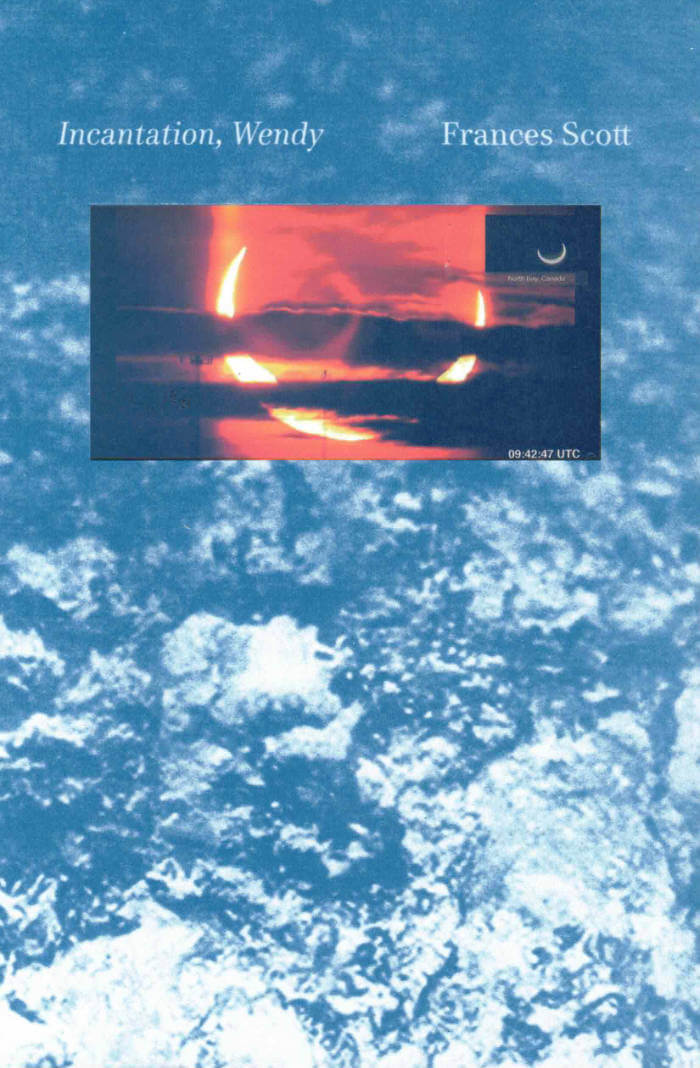
Incantation, Wendy
This book is an incantation for Wendy (2023), a film fan letter from artist Frances Scott to composer Wendy Carlos. Written contributions from Beth Bramich, Stine Hebert, Juliet Jacques, Tom Richards, Chu-Li Shewring and Dave Tompkins are accompanied by hand-drawn music scores, film stills and script notes produced during Scott’s research, and her moving-image work Valentina (2020), a rehearsal to camera with performer Valentina Formenti.
Incantation, Wendy precedes the film Wendy and meditates on Carlos as ‘The Original Synth’, moving across channels that speak of the unbounded voice in collaboration, synthesis and transition; through vocoders, archives, re-readings, light pulses, solar flares and cyclical returns; and in concert with horses, moons and a sun, eclipsing as it rises above the horizon.
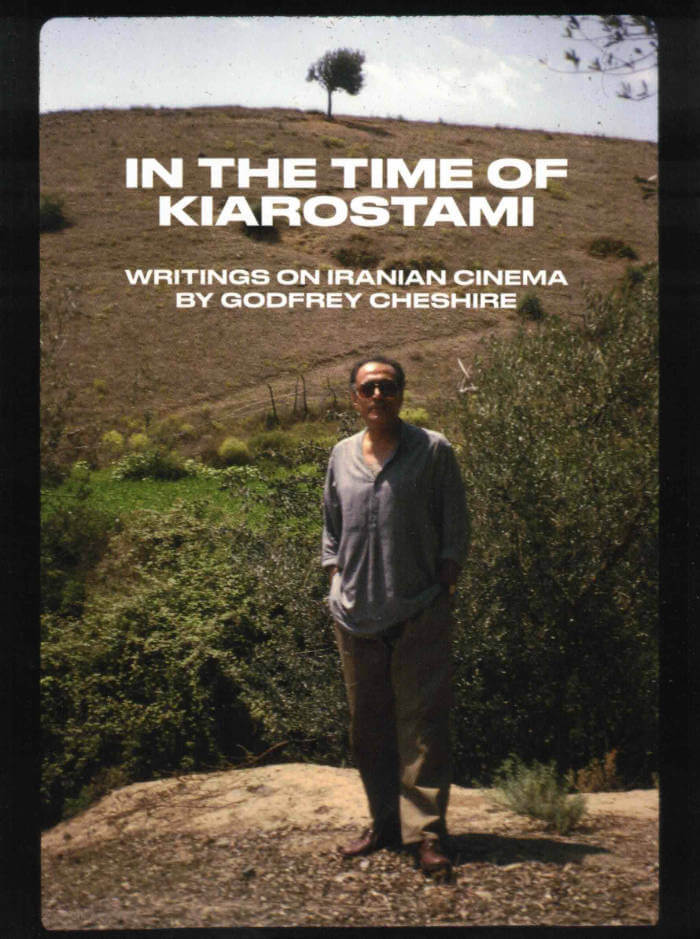
In the Time of Kiarostami: Writings on Iranian Cinema
“There is no better way to discover Iranian cinema than to immerse yourself in Godfrey Cheshire’s beautifully written 30 year personal cinematic journey. This is an important, informative and compelling book at this global political moment. It is vital to know these filmmakers of purpose through the perception of an outsider with whom we can identify and to lose ourselves to the wonder, humanity, and artistry of a culture and cinema that demands our attention now more than ever.” — Michael Barker, Sony Pictures Classics
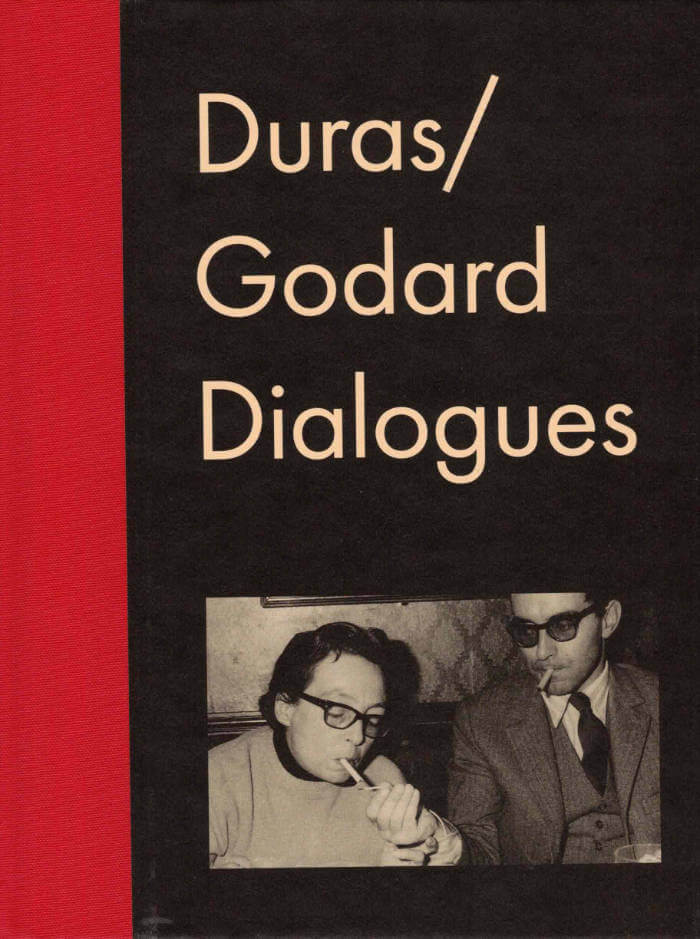
Duras/Godard Dialogues
Three dialogues between Marguerite Duras and Jean-Luc Godard from 1979, 1980 and 1987.
“The two demonstrate a profound shared passion, a way of literally being one with a medium and speaking about it with a dazzling lyricism interspersed with dryly ironic remarks, fueled by a conviction that inspires them to traverse history. Their point of intersection is obvious. Duras, a writer, is also a filmmaker, and Godard, a filmmaker, has maintained a distinctive relationship with literature, writing and speech.”—Cyril Béghin
Introduction, afterword and footnotes by Cyril Béghin.
Translation by Nicholas Elliott.
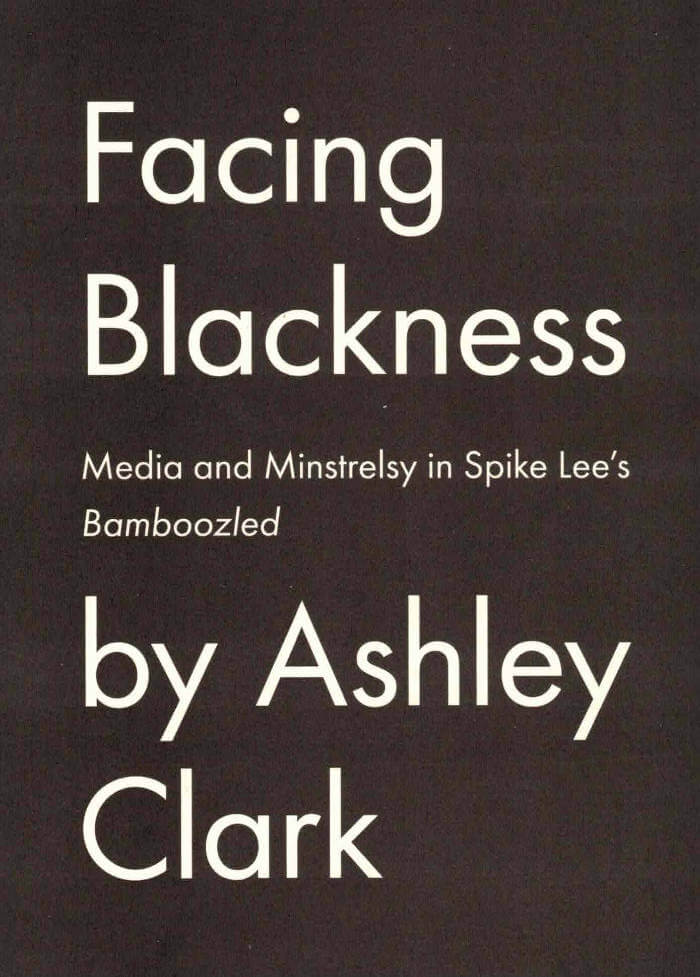
Facing Blackness
“In Facing Blackness, Ashley Clark traces the contours of Bamboozled, guiding readers through Lee’s intricate representation of race, politics, and popular culture. Clark moves beyond straightforward film criticism to situate the film within a complex history of blackness and American entertainment, making a powerful argument for its ongoing relevance and vitality. Thoughtful, rigorous, and witty, Facing Blackness is a thoroughly engaging analysis of this monumental film that is imperative reading for fans of Spike Lee and cinephiles more broadly.” — Racquel Gates, author of Double Negative: The Black Image and Popular Culture
Ashley Clark is a writer, critic and film programmer. He was born in London, lives in Jersey City, and works in Manhattan. Facing Blackness, initially published in 2015, is his first book. This revised second edition contains a new foreword.
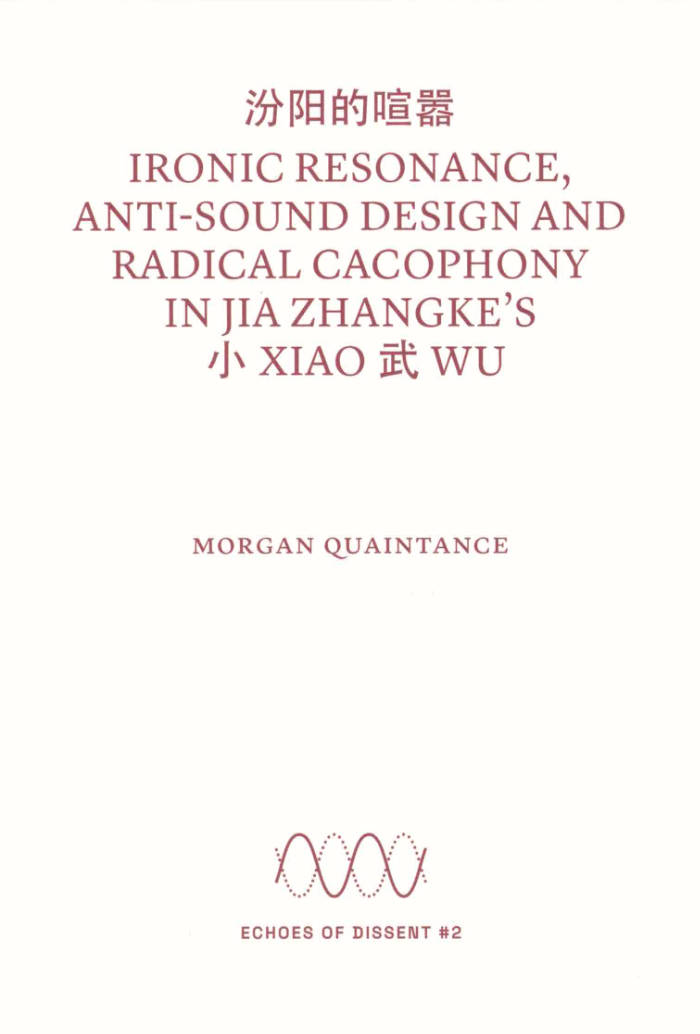
Ironic Resonance, Anti-sound Design and Radical Cacophony in Jia Zhangke's Xiao Wu
In the context of The Skin of the World program at Courtisane festival 2024, Morgan Quaintance was invited to reflect on the use of sound in Jia Zhangke’s Xiao Wu (Pickpocket).
This is the second publication in the Echoes of Dissent series, devoted to the politics of the soundtrack.

Amateur
Amateur is the first comprehensive publication about Wendelien van Oldenborgh’s moving-image work and accompanying installations. Developed over the past ten years, these works explore communication and interaction between individuals, often set against the backdrop of a unique public location in order to cast attention towards repressed, incomplete, and unresolved histories. Through the staging of these encounters in film, Van Oldenborgh enables multiple perspectives and voices to coexist, and brings to light political, social, and cultural relationships and how they are manifested through social interactions. The publication is generously illustrated and brings together a wealth of texts by artists, curators, and writers who have been key interlocutors with Van Oldenborgh, and offer in-depth observations and reflections on a work from her oeuvre.
Contributors: Nana Adusei-Poku, Ricardo Basbaum, Frédérique Bergholtz, Eric de Bruyn, Binna Choi, David Dibosa, Denise Ferreira da Silva, Avery F. Gordon, Tom Holert, Nataša Ilić, Charl Landvreugd, Sven Lütticken, Anna Manubens, Ruth Noack, Grant Watson.
Design: Julia Born
Publishers: If I Can’t Dance; The Showroom, London; and Sternberg Press, Berlin
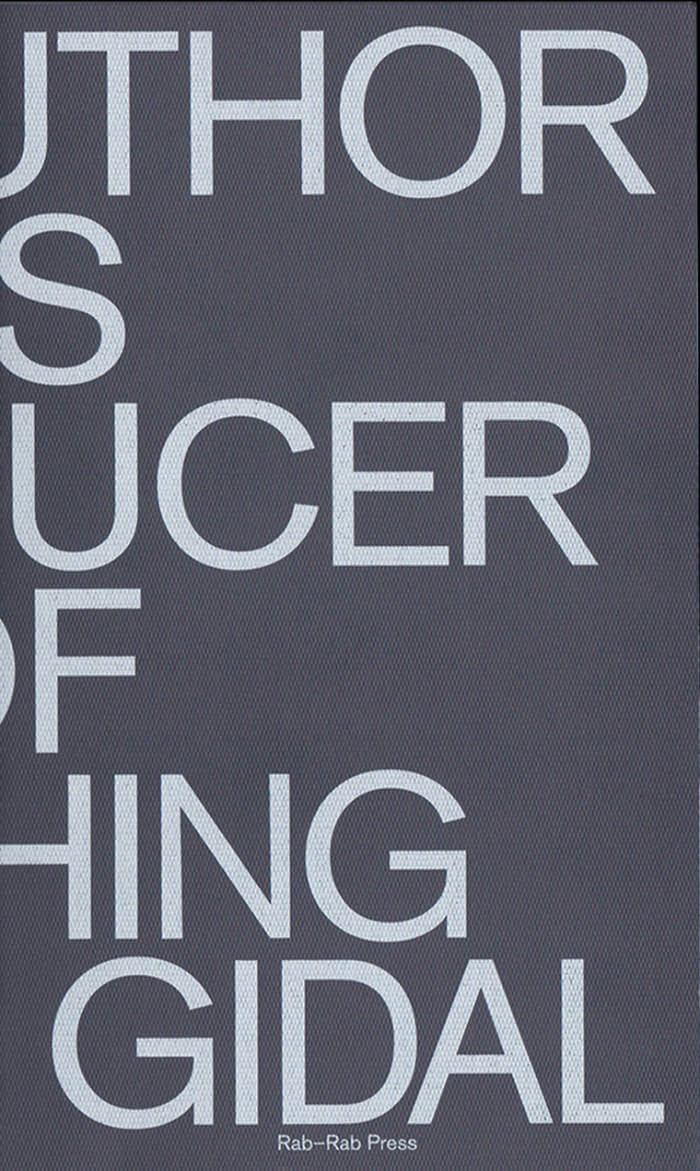
The Author as Producer of Nothing
The first publication of a lost 1978 text by Peter Gidal—one of the most influential experimental filmmakers ever.
The book includes the first publication of Peter Gidal's text from 1978, with a new introduction. Gidal in this dense theoretical essay deals with the limits of language and representation in the practice of experimental filmmaking and writing. Gidal's lost text The Author as Producer of Nothing will give a new insight into the theoretical and political context to experimental film practices.
The afterword by Sezgin Boynik discusses in detail the political contradictions of Gidal's filmic non-objectivity.
"The process of the film's making deals with devices that result in demystification or attempted demystification of the film process. But by 'deals with' I do not mean 'represents'. In other words, such films do not document various film procedures, which would place them in the same category as films which transparently document a narrative, a set of actions, etc. Documentation, through usage of the film medium as transparent, invisible, is exactly the same when the object being documented is some 'real event', some 'film procedure', some 'story', etc. An avant-garde film defined by its development towards increased materialism and materialist function does not represent, or document, anything. The film produces certain relations between segments, between what the camera is aimed at and the way that 'image' is presented. The dialectic of the film is established in that space of tension between materialist flatness, grain, light, movement, and the supposed reality that is represented. Consequently a continual attempt to destroy the illusion is necessary."—Peter Gidal
Peter Gidal (born 1946 in New York) is an influential British film theorist and avant-garde filmmaker, associated with the English "Structural/Materialist" movement (along with Malcolm Le Grice notably). He has published in numerous magazines (Studio International, Screen, October, Undercut) and is the author of several books, including Andy Warhol: Films and Paintings (1971), Materialist Film (1988) and Understanding Beckett: A Study of Monologue and Gesture in the Works of Samuel Beckett (1986).

Scrapbook – 40 ans de Light Cone
A visual anthology compiling the contributions of the filmmakers who are part of the Light Cone collection, a key institution for the distribution, promotion and preservation of experimental cinema in France and around the world, on the occasion of its 40th anniversary.
2022 marks an important moment for Light Cone: its 40th anniversary. Such an event should be celebrated in the best possible way. Light Cone has come together thanks to the filmmakers whose films entered the collection over the years. We've decided to invite them to participate in an editorial project, a book in which we would publish their contributions: letters, postcards, photographs, drawings, film stills, collages, etc., which they have sent us for the occasion of the anniversary. A collective scrapbook in which the materiality of the objects—paper, photos, colors, handwritten notes—evokes that of analog cinema, which we have always defended. A book of images is born, and through the creation of this micro-collection, so is a portable museum of about one hundred pieces, which are ready to be exhibited and which will remain in the care of Light Cone's archive.
With Michel Amarger, Martin Arnold, Caroline Avery, Peter-Conrad Beyer, Giuseppe Boccassini, Patrick Bokanowski, Louise Bourque, Robert Breer, Dietmar Brehm, Claudio Caldini, Stefano Canapa, Abigail Child, Pip Chodorov, Martha Colburn, Philippe Cote, Sandra Davis, Frédérique Devaux, Karel Doing, Anja Dornieden, Flatform, Cécile Fontaine, Olivier Fouchard, Su Friedrich, Siegfried Alexander Fruhauf, Peter Gidal, Milena Gierke, Christoph Girardet, Juan David, Gonzalez Monroy, Christophe Guérin, Nicky Hamlyn, Barbara Hammer, Teo Hernandez, Tony Hill, Mike Hoolboom, Jakobois, Larry Jordan, Patrice Kirchhofer, Maria Kourkouta, Alexandre Larose, Christian Lebrat, Emmanuel Lefrant, Maurice Lemaître, Jeanne Liotta, Rose Lowder, Johann Lurf, Pablo Marín, Mara Mattuschka, Bruce Mcclure, Miles Mckane, Luc Meichler, Barbara Meter, Peter Miller, Matthias Müller, Michel Nedjar, Dominique Noguez, Vivian Ostrovsky, Simon Payne, Emmanuel Piton, Charlotte Pryce, Gisèle Rapp-Meichler, Abraham Ravett, Emily Richardson, D.N. Rodowick, Gaëlle Rouard, Martine Rousset, Pierre Rovere, Ben Russell, Daïchi Saïto, Maki Satake, Sylvia Schedelbauer, Jeff Scher, Stanley Schtinter, Guy Sherwin, José Antonio Sistiaga, John Smith, Vicky Smith, Michael Snow, Malena Szlam, Mika Taanila, Marcelle Thirache, Trinh T. Minh-ha, David Wharry, Telemach Wiesinger, Antoinette Zwirchmayr.
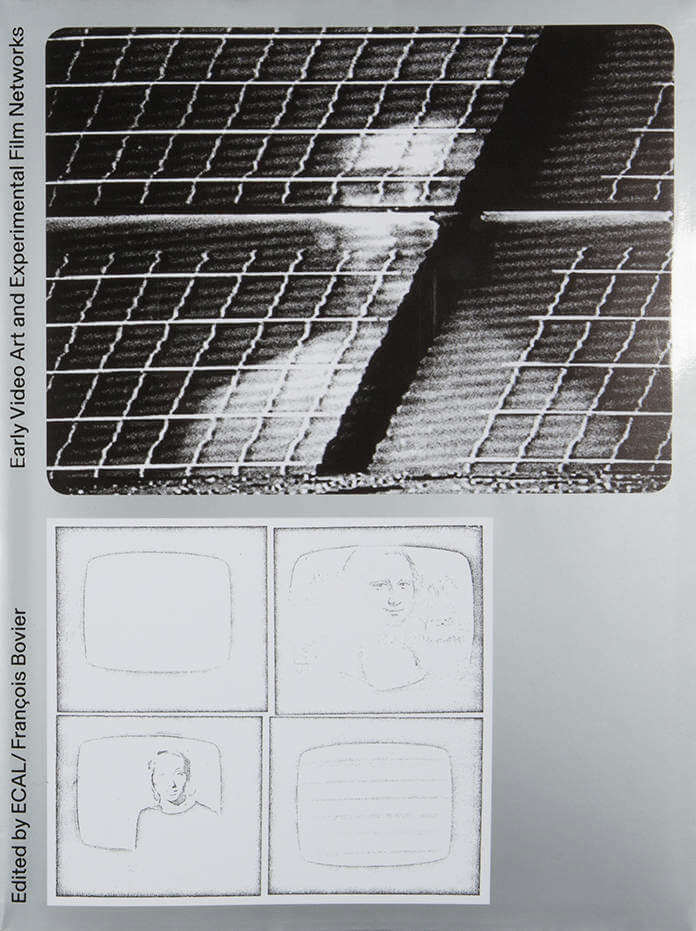
ECAL (Lausanne University of Art and Design)
Early Video Art and Experimental Films Networks
An international history of video art and experimental cinema networks in the early 1970s: the volume casts a new eye on various exhibitions, broadcasts and production and distribution structures, including a case study on Jonas Mekas' Anthology Film Archives.
Early Video Art and Experimental Films Networks traces the diffuse international networks through which video art and experimental films circulated during the late sixties and early seventies. It explores forgotten exhibitions both in Switzerland and France, the activities of public television channels and alternative art spaces in the US, a production art center dedicated to video in Italy and an Argentinian collective of conceptual artists, aiming to shed new light on the production and diffusion of moving images.
This volume is divided into two parts: the first part, which is longer and more extensively documented, explores the emergence and consolidation of video art networks at international level; the second focuses more specifically on two exhibitions of artists' films (New Forms in Film and Une histoire du cinéma) and one of the main instances of the museification of experimental cinema, Anthology Film Archives. Indeed, this particular story has wider currency insofar as several important works in recent years have focused on artists' films 23 and expanded cinema 24. We have adopted the principle, wherever possible, of providing rare and previously unpublished images and documents alongside the essays specifically commissioned for this volume, the choice of which has been left to the discretion of the author of each particular chapter.
Texts by Kristen Alfaro, François Bovier, Enrico Camporesi, Katarzyna Cytlak, Larisa Dryansky, Tristan Lavoyer, Adeena Mey, Kris Paulsen, Cosetta G. Saba, Andrew V. Uroskie.

Énergies
Les sculptures et les films de Judith Hopf sont alimentés par des réflexions sur les relations que les êtres humains entretiennent avec la production et la technologie. Pour Énergies, sa première exposition monographique en France qui eut lieu conjointement à Paris à Bétonsalon et au Plateau, Frac Ile-de-France, l’artiste s’est concentrée sur cet élément invisible dont la quête accompagne notre quotidien et nos activités, produit par la conversion de ressources naturelles en puissance. Ce catalogue réunit des reproductions de dessins inédits, un entretien avec l’artiste et un texte critique de Tom Holert qui fait retour sur vingt années de travail.
Judith Hopf's sculptures and films are fuelled by reflections on the relationship human beings have with production and technology. For Énergies, her first solo exhibition in France, held jointly in Paris, at Bétonsalon and Plateau, Frac Ile-de-France, the artist focused on this invisible element whose quest accompanies our daily lives and activities, produced by converting natural resources into power. This catalog features reproductions of previously unpublished drawings, an interview with the artist and a critical text by Tom Holert, looking back over twenty years of work.
Textes / Texts
- François Aubart, Xavier Franceschi et Émilie Renard, "À propos d’énergie, d’amour et de chansons : conversation avec Judith Hopf"
- Tom Holert, "Changements de rythme : La méthodologie énergétique de Judith Hopf"
- François Aubart, Xavier Franceschi et Émilie Renard, "On Energy, Love, and Songs: Conversation with Judith Hopf"
- Tom Holert, "Changing Pace: Judith Hopf’s Energetic Methodology"
Traduction / Translation
Jean-François Caro
Louise Ledour
Typesetting : Olivier Lebrun
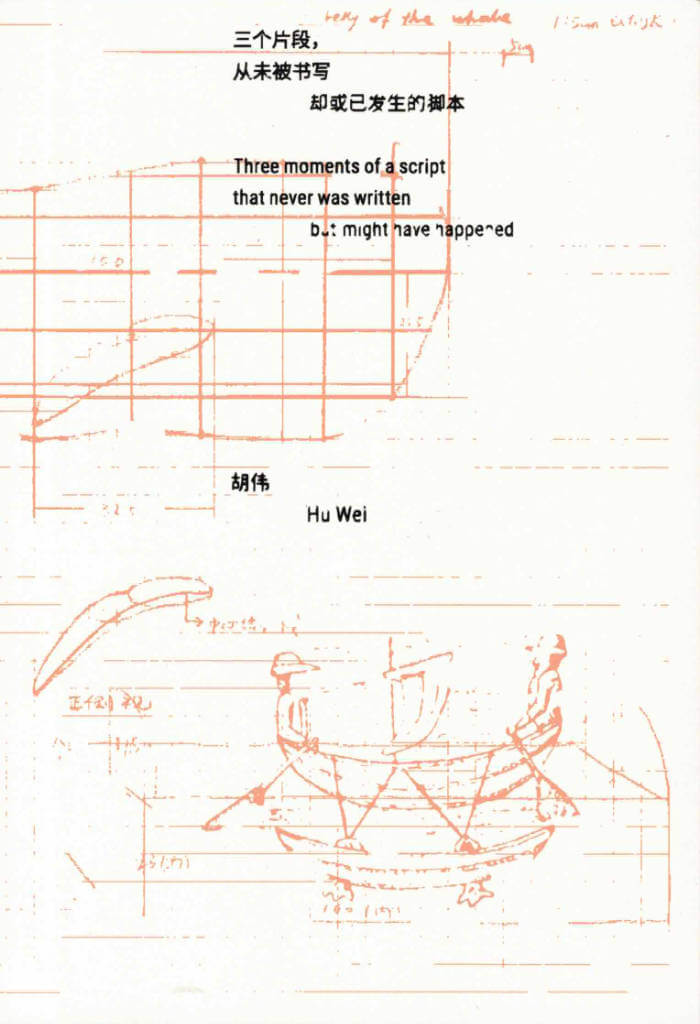
Three moments of a script that never was written but might have happened
This publication departs from three video works by the artist Hu Wei, exploring the possibilities of devising new scripts within the manifold connections between materials for creative works, images, and texts.
The first part of the publication transcribes and recompiles the narrations in his videos into three sets of juxtaposed scripts. Each of these textual fragments showcases an “anatomical section of an era” from disparate geopolitical contexts: a family letter from Sabah, a set of Rashomonian testimony, and an anecdote about the anonymous.
The second part is a notebook-like atlas that unfolds following the clues of three keywords: “Fabrication,” “Anonymity,” and “Boundary.” Within this section, different types of images and texts, including factual materials, embodied research and survey records, as well as fabricated documents, interlace with each other. They serve as an interrogation, extension, reconstruction, and reassemblage of three muted histories or events.
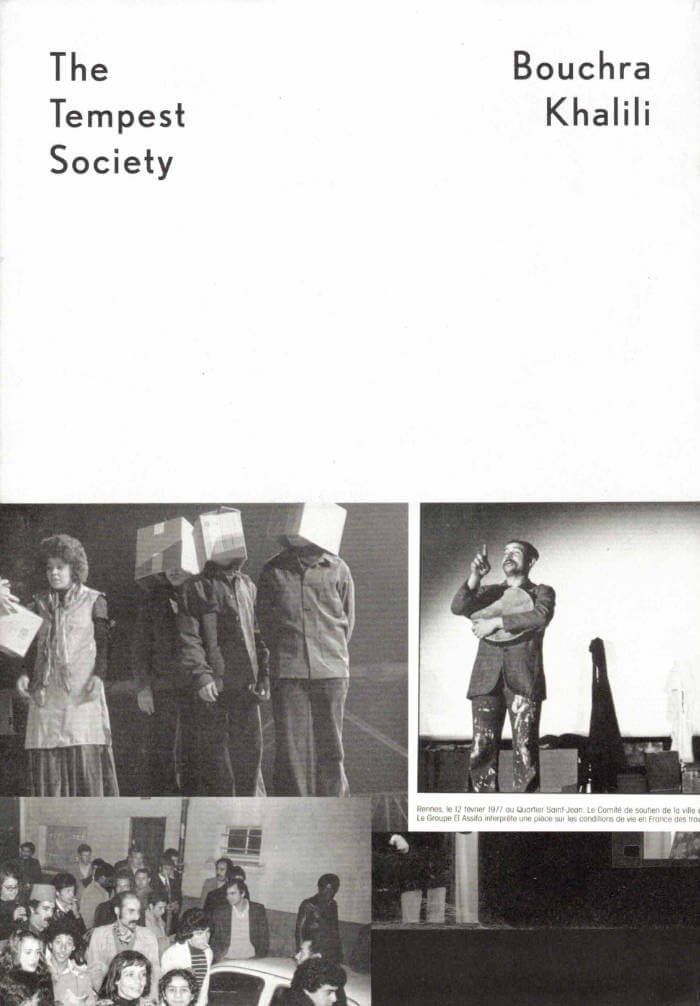
The Tempest Society
Gathering together interviews, essays, rare archival material and translations, The Tempest Society revisits and resuscitates the forgotten heritage of a politicised theatre group – ‘Al Assifa’ – that was born out of the struggles of the Mouvement des travailleurs arabes (MTA), Palestine, anti-colonialism, and workers’ and immigrant labour rights. Contributors explore the legacy of the group – placing this history in the context of the European economic crisis and its effect on Greece, contemporary migration and the conditions of immigrant workers and refugees. Conversations with the artist, and participants and collaborators in her film, consider the potential for politicised art to move between the street and the factory in cultural production today.
Following The Tempest Society (2017), the original video installation commissioned for documenta 14, which took Athens as a site to reflect on radical equality, democracy and theatre as a civic space, the book brings to light the specific history, the archive, and the ongoing resonance of the agit-prop theatre group ‘Al-Assifa’ in the context of urgent economic, political and humanitarian upheaval.
With contributions from Abdellali Hajjat, Hendrik Folkerts, Pothiti Hantzaroula, and interviews with Philippe Tancelin, surviving member of Al Assifa, Bouchra Khalili, Omar Berrada, and Alexandre Kauffmann, and Isavella Alopoudi, Elias Kiama Tzogonas, and Giannis Sotiriou, the performers in The Tempest Society.
Bouchra Khalili is a Moroccan-French visual artist. Raised between Morocco and France, she studied Film at Sorbonne Nouvelle and Fine Arts at École Nationale Supérieure d’Arts de Paris-Cergy. Recent exhibitions include solo shows at MFA, Boston, Jeu de Paume, Paris and Sessession, Vienna. In 2018 she has been shortlisted for both the Guggenheim’s Hugo Boss Prize and the Artes Mundi Prize. She currently lives in Berlin.
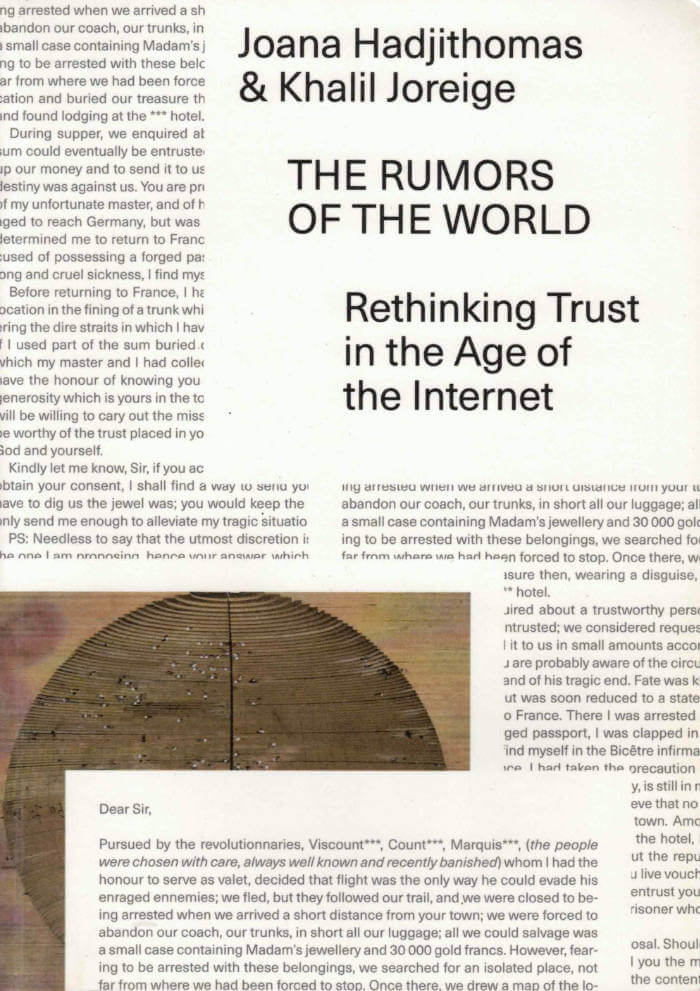
The Rumors of the World – Rethinking Trust in the Age of the Internet
Khalil Joreige, Joana Hadjithomas
This book traces the work and research of filmmakers and visual artists Joana Hadjithomas and Khalil Joreige and their exploration through their work of online spam e-mails, specifically, advance-fee frauds and scam messages.
This monograph presents material collected by the artists since 1999, focusing on the way that personal narratives are formed and articulated in a post-digital age. This work functions as a starting point for a broader discussion by leading scholars and thinkers on the nature of power and trust in the age of the Internet. Underlying this is an interrogation of faith: How has trust been recomposed by the Internet, and equally, how does the traditional practice of faith question the way that individuals relate to each other online?
Since the mid-1990s, Lebanese artists Joana Hadjithomas & Khalil Joreige (b. 1969, live and work in Beirut, Lebanon, and Paris) have worked together in the visual arts and cinema–shooting documentaries and fictions such as "I Want To See," starring Catherine Deneuve and Rabih Mroué and screened at the Cannes Festival in 2008.
Their practice in both fields is imbued with a distinctive aesthetic that occupies spheres of the visible and the fictional, nourishing a fascinating back and forth between life and fiction. Investigative processes, excavation, and the representations of historic, social, cultural, and political factors are at the heart of their practice. In their words: "All our work exists on the frontier of a reality where the question of the territory and its delimitation (that of art, that of personal life), the question of the social body and the individual body, are constantly being posed."
Their films have been multi awarded in international festivals and enjoyed releases in many countries. Their artworks have been shown in museums, biennials and art centers around the world, in solo or collective exhibitions and are part of important public and private collections, such as Musée d'Art Moderne de la Ville de Paris; Guggenheim, New York; Centre Georges Pompidou, France; V & A London, Sharjah Art Foundation, UAE, etc.
Edited by Omar Kholeif.
Contributions by Nicholas Auray, Finn Brunton, Joana Hadjithomas & Khalil Joreige, Henriette Huldisch, Omar Kholeif, Norman M. Klein, Eric Mangion, Laura U. Marks, Franck Leibovici, Sarah Perks, Jacques Rancière, Uzma Rizvi, Rasha Salti.

Snaturamenti
A workbook by Flatform on displacement, conceived and curated by Giuliana Prucca.
The book is published under four different covers and with four different layouts, randomly distributed.
Founded in 2006 and based in Berlin and Milan, Flatform is a video and media arts collective, at the border between experimental cinema and contemporary art, that creates time-based works, film events, and installations, most of which revolve around landscape and biopolitics. Distributed by Light Cone in Paris and by Video Data Bank in Chicago, works by Flatform have competed in major film festivals including Cannes, Rotterdam, Venice, Toronto, and have been shown worldwide in art venues such as Centre Pompidou, Haus der Kulturen der Welt, Hirshhorn Museum, MAXXI Museum, Eye Filmmuseum, Wexner Center for the Arts and Garage Center for the Arts.
Co-published by Light Cone and Avarie.
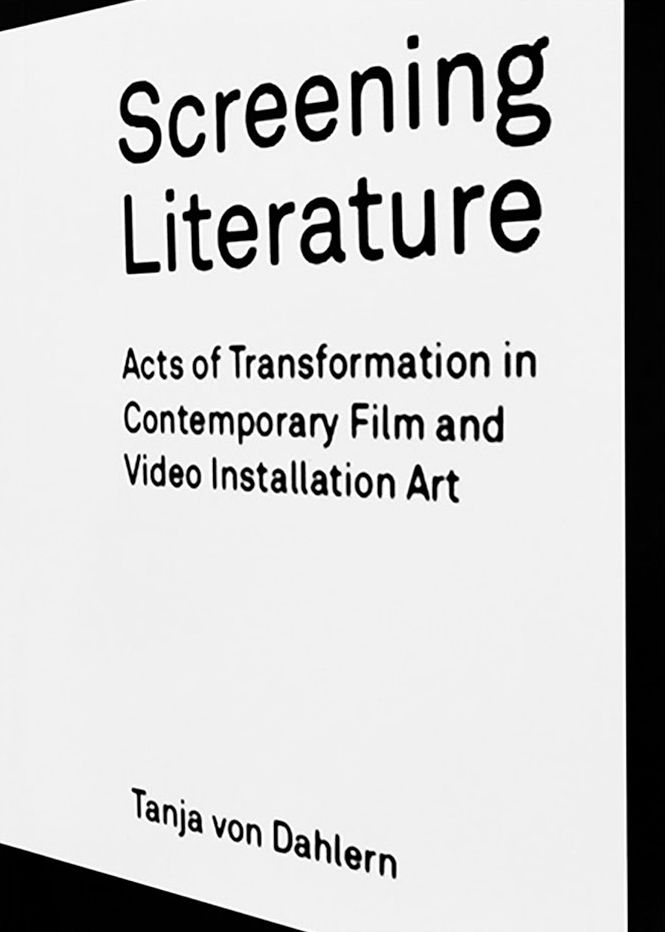
Screening Literature
Based on the doctoral thesis of Tanja von Dahlern, this book examines the ways in which literary works have been staged and transformed in visual art, specifically in the field of contemporary film and video installation since the mid-1990s.
Focusing on artworks by Kutlug Ataman, Gerard Byrne, Stan Douglas, and Fiona Tan, it explores the role of literature in relation to cultural memory, as a place where narrative conventions are negotiated, and where cultural space is mediated and constructed. Transformation is discussed as an important element in our culture today, drawing on theories from intertextuality, intermediality, adaptation studies, and artistic appropriation.